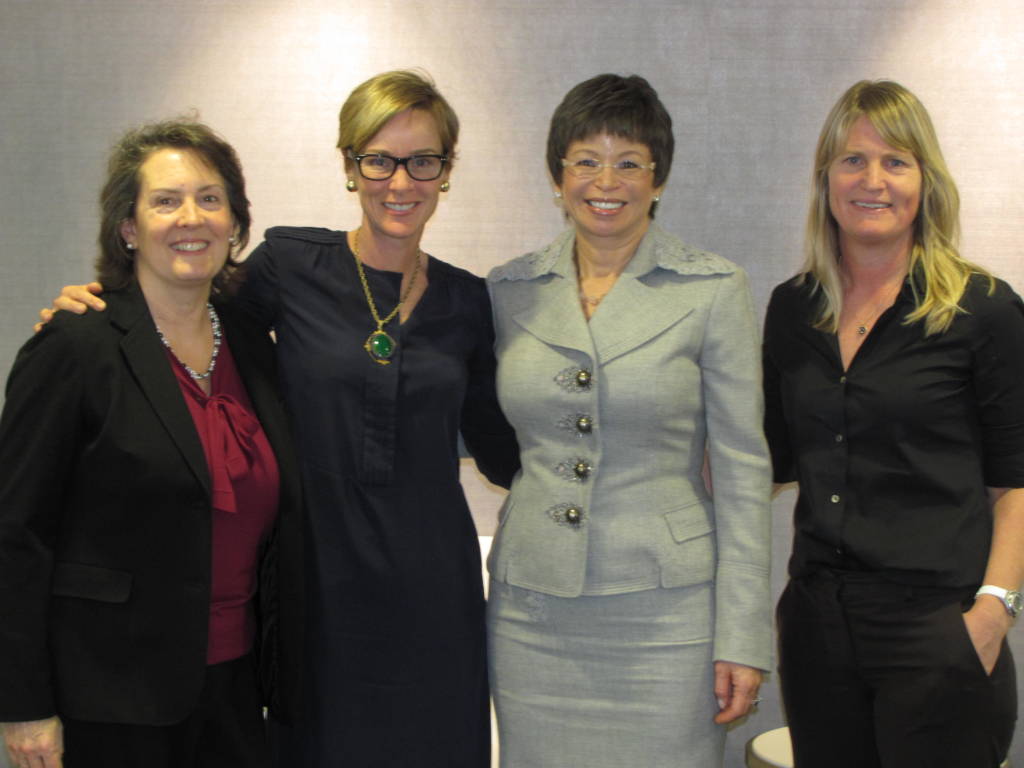In 2008, 98 percent of the domestic violence cases before the DC Superior Court lacked legal representation. Seventy-seven percent of plaintiffs involved in DC Superior Court family law cases represented themselves in court. More than 98 percent of respondents in child support and paternity cases represented themselves, according to a report by the DC Access to Justice Commission, a privately-funded watchdog organization.
When Jenny Brody, Karen Barker Marcou and Marla Spindel founded the DC Volunteer Lawyer Project that same year, they aspired to change the District’s statistics.
All three women had worked full-time as lawyers before scaling back their careers to raise their children. Individually, all three had started representing poor clients in family court for free. Although they were passionate about providing this pro bono legal counsel to the underserved, they missed the resources and collegiality they had enjoyed during their days working in law firms.
They founded the DC Volunteer Lawyer Project (DCVLP) with the goal of offering support to other volunteer lawyers who were, like them, working in isolation to represent poor and indigent clients. More than 30 like-minded lawyers came to the first interest meeting the women held during a snowstorm in January 2008.
The DCVLP now has more than 800 registered volunteers in the District. Some are also stay-at-home mothers, others are recent law school graduates, still others are retirees.
“We were able to tap into this enormous resource that [would not have been used] otherwise,” explained Karen Bates, who serves as DCVLP’s director of development.
Each volunteer has active bar membership and completes training provided by the project in his or her specific area of work. Together, volunteers handle more than 500 cases each year in the areas of domestic violence and child advocacy and provide free legal advice at a weekly clinic.
The project targets clients who live at 200 percent or less of the poverty level. Cases are prioritized based on the presence of children in the home and the potential lethality of the case based upon indicators such as addiction, threats, violence incidents and gun ownership.
The priority is determined by the Domestic Violence Intake Center, a collaboration of governmental and non-governmental agencies that provides the DCVLP with the majority of its cases.
The DCVLP’s services in family law are important to clients because, unlike in criminal court cases, parties in civil court do not have entitlement to a lawyer regardless of ability to pay. These cases can determine a person’s physical safety, need for shelter, and ability to work, as well as the custody of a child, to name just a few issues. Volunteers advocate for protective court orders, custody and divorce cases, and make recommendations to the court on behalf of children caught in murky custody battles.
The DCVLP also aims to give clients access to every resource they need, a challenging goal in the District’s complex system of aid.
“We’re trying to get the barriers out of the way,” said Ashley Badgley, who serves as program and outreach manager at DCVLP.
Frequently, clients such as domestic violence victims are reluctant to contact a service provider out of fear that seeking aid will result in repercussions. They worry about things such as needing to leave the home they may be sharing with their abuser. DCVLP’s domestic violence client advocate Kate Margolis described the dilemma faced by many poor victims over the past winter. “This year, it got quiet because it was cold. They knew they didn’t have [housing] resources.”
Although there are a range of services for the approximately 20 percent of DC residents living in poverty, they can be difficult to navigate, particularly if a person requires help in multiple areas. The cost, time, and knowledge it takes to access the resources often deter the people who need them from getting help.
Even Margolis, who contacts each client and ensures he or she receives every necessary service, occasionally feels overwhelmed. “The system [of DC services] is frightening,” she said. “There are so many… and they are so far-reaching… I still can’t figure it all out.”
The Project’s commitment to each of its clients guarantees they receive the help they need, from consistent emotional support and follow-up to help with minor expenses, like the Metro fare a client might need to get to court. Although the organization was originally privately funded, it has since obtained both local and federal grants.
Margolis said she never sends a client to a resource she is not personally familiar with. She constantly connects with her clients, providing the initial phone call, a follow-up call, and a call the day before the court date. She’s always present at the DCVLP’s clinics, and she even occasionally goes to court if it benefits the client, who often is a victim of domestic abuse confronting her abuser.
“Once you’re my client, you’re always my client,” Margolis said.
Despite the DCVLP’s commitment, family law has its challenges. Many clients involved in divorce cases discover how long the process takes in court and falter. Clients with civil protection orders require constant supervision because the orders expire after one year in the District and need to be renewed in a timely fashion. When domestic violence victims are also immigrants relying upon their abuser to sponsor their residency in the United States, they face the risk of deportation. Often, child advocacy cases can continue for years. Most require at least eight months.
But no matter how difficult the situation, the DCVLP will represent its clients to the end.
“We will not abandon them,” Margolis promised.








